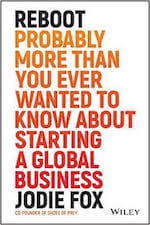Jodie Fox’s entrepreneurial book is not the typical one we’re used to hearing about. It’s as raw as it is practical, detailing the highs and lows of building her global business, Shoes of Prey.
While plenty of entrepreneurs are willing to share their ups and downs on the path to success, they usually then stop at the success. Rarely do we see what happens next for so many: in Jodie’s case, this included taking out kidnapping insurance as their factory in China slowed down, and stepping into the CEO role during Shoes of Prey’s final days and most tumultuous period.
When she says, “They say entrepreneurs live four years for every one, and I really feel that,” you also really believe it too. Especially after reading her book and getting an inside look at the frenetic pace and single-minded focus she maintained while building Shoes of Prey, with co-founders former husband, Michael Fox, and his fellow former Google colleague, Michael Knapp.
The end came very publicly in August 2018, with Fox posting on social media that Shoes of Prey had ceased operations. As one of our most celebrated female entrepreneurs, it made difficult reading at the time for those of us who have covered this space extensively. Jodie declared her heart was broken and promised to share more on the story so “others can learn from the experience.”
Just over 12 months later, Fox has gotten married, moved back to Australia, is preparing to welcome her first baby, and has lived up to her promise to share more, penning her memoir, Reboot: More Than You Ever Wanted To Know About Running A Global Business.
She’s deep into her own Reboot, settling into the life that comes after spending a decade throwing everything at a business, which saw her move to Los Angeles and travel extensively to China.
And she’s open and willing to talk about failure – not necessarily the too often bandied about ‘fail fast’ idea, but more so the fact that failure can carry shame and pain and that we need a place to acknowledge it.
Reboot details Jodie’s role in the full circle of Shoes of Prey, everything from how and when they worked, to coming up with the business name, pitching to investors and establishing a factory in China.
She shares how they raised tens of millions of dollars in funding, built innovative tech that enabled customers to design bespoke footwear online, opened flagship stores in David Jones, along with several physical locations in Nordstrom in the United States.
But she also shares some of the challenging lows, including the breakdown of her marriage (and fears about explaining it to staff and investors), personal struggles with mental health, and managing everything that comes with running out of ‘runway’ (funding), including having to let staff go.
Jodie says she’d often joke about Shoes of Prey being her life, but the reality is that it really was her life. So, without it, she’s been having to find a new identity outside of being ‘Jodie Fox from Shoes of Prey’.
The months after that social media post were difficult. While she was still exploring options for a sale and managing the weight of having to let people go, along with managing investors and liquidators, she spent a lot of time sitting alone in her apartment.
“I felt the weight and shame,” she tells me.
“Sitting in my apartment, the first things I was looking for was to be needed, so I kept busy. I cleaned every surface. I found every sock. I watched the Sopranos from start to finish. I spoke to the Wall Street Journal on what my opinion was on Tony Sopranos shirts. The one thing I didn’t do was socialise very much because I felt very ashamed of what had happened.”
Still, Jodie had plenty of reasons to be proud. During the final year (by that point, both her co- founders had stepped out), Jodie realised she had what it took to be a CEO – and a CEO during one of the most difficult periods a business can face.
“To be across all of it and executing those things, it strangely gave me this confidence that I’d never had in my career before and I realised I’d been searching for.”
While working in China at a precarious time given money was short and they had 140 factory workers to look after, she also realised her ‘fight’ response is significantly higher than the her ‘flight’ one.
She learnt that kidnapping was a very real risk, given factory workers can easily see when things are slowing down in a business and it was possible for staff to resort to kidnapping the owner in order to ensure they got the severance they’re owed. Undeterred, Jodie took out kidnapping insurance and booked hotels under different names while her manager worked on a system with staff to ensure they could check in every day at 4pm to see that enough money was in the account for severance.
“I couldn’t imagine who in the factory would initiate a kidnapping, but at the same time when feelings of disempowerment are coming in, you never know,” she says.
“I think that when those things turn up, you either choose to jump in and fight, or you say this is not for me.”
She says knowing the numbers and having as many details to hand as possible gave her the confidence to make the big decisions during this difficult period.
Staying nice, even during the most challenging conversations, gave her the sense that she was staying true to her values and doing the right thing by the many other people who were also involved in Shoes of Prey, particularly employees and investors.
“Being nice is a good thing in business,” she says. “When we bring that anger or nastiness in, when you do that you instantly trigger everyone else in the room. You ask everyone you’re trying to work with to defend themselves, or to prove themselves, or to reply in kind so that they are not taken advantage of.”
There’s always a place for firm leadership, but Jodie says it needs to be executed from a place of being open and honest, and ultimately wanting the best outcome for those involved.
There’s also a place for criticism, especially when it comes to reflecting on failure. “But what I don’t believe in is just attacking. When you do that it’s not fostering a conversation that helps anyone from moving forward. Nobody’s learning anything.
“Failure without learning is one of the greatest wastes of time.”
Jodie says she’s very much in the midst of her reboot, while at the same time preparing for a huge life change as she welcomes her first baby, due on International Women’s Day 2020.
She spent most of her time at Shoes of Prey as its creative director, but it was that final period as a CEO that gave her the confidence she had long been searching for, especially having fought through ‘imposter syndrome’ throughout her career. “It ended up being very rewarding,” she says.
And it’s helped set her up for whatever comes next. Although beyond her impending life change of becoming a parent, Jodie’s not sure what that is.
“Honestly? Today I’m still trying to find what the next thing is and get comfortable with what my identity is.”
Jodie Fox’s memoir is available at all good bookstores and from Booktopia.
This content is published as part of The Thought Leaders Hub, supported by Wiley.
Check out more from the hub, covering entrepreneurship, finance, leadership, personal development and influence with a range of female authors.





